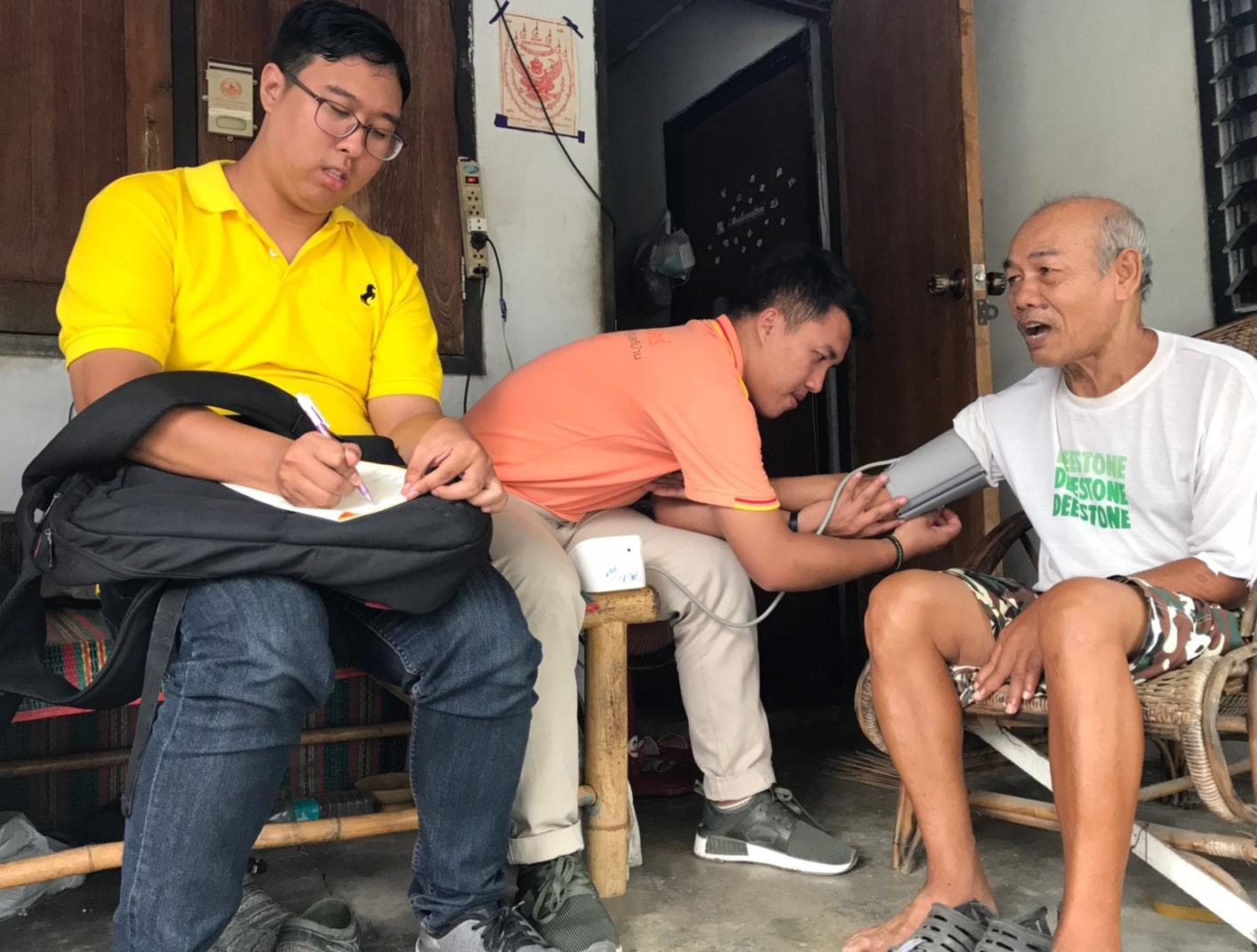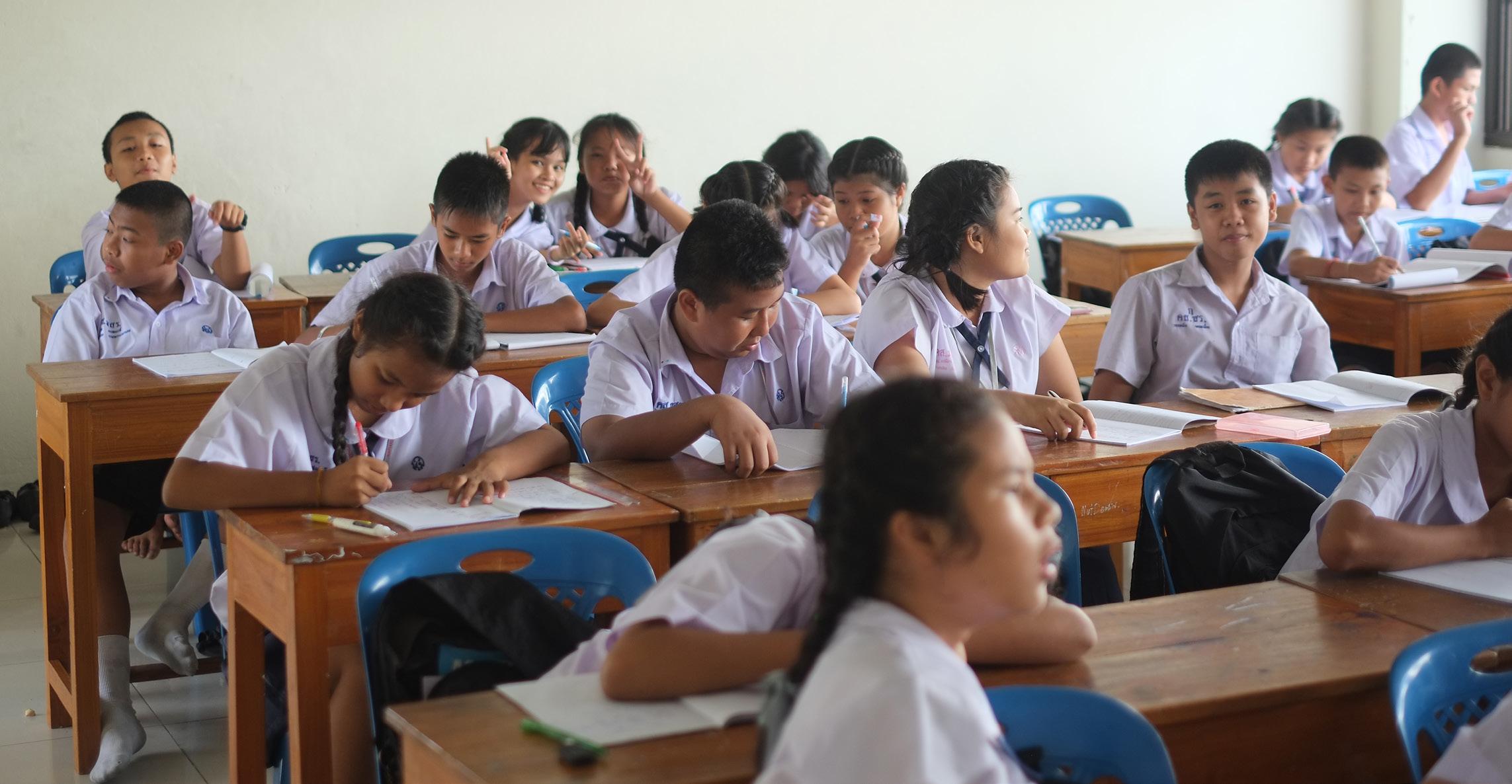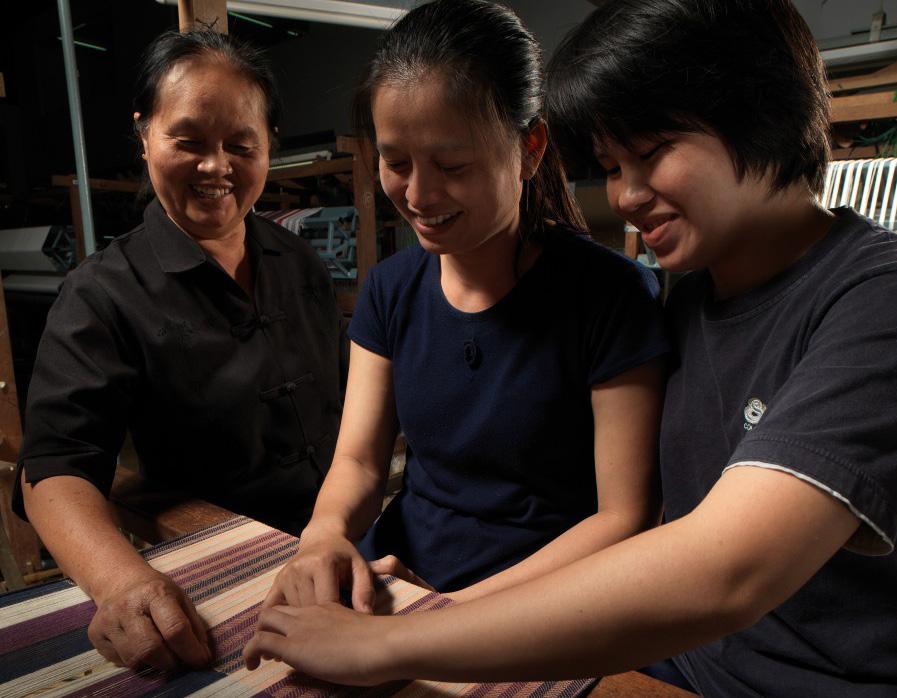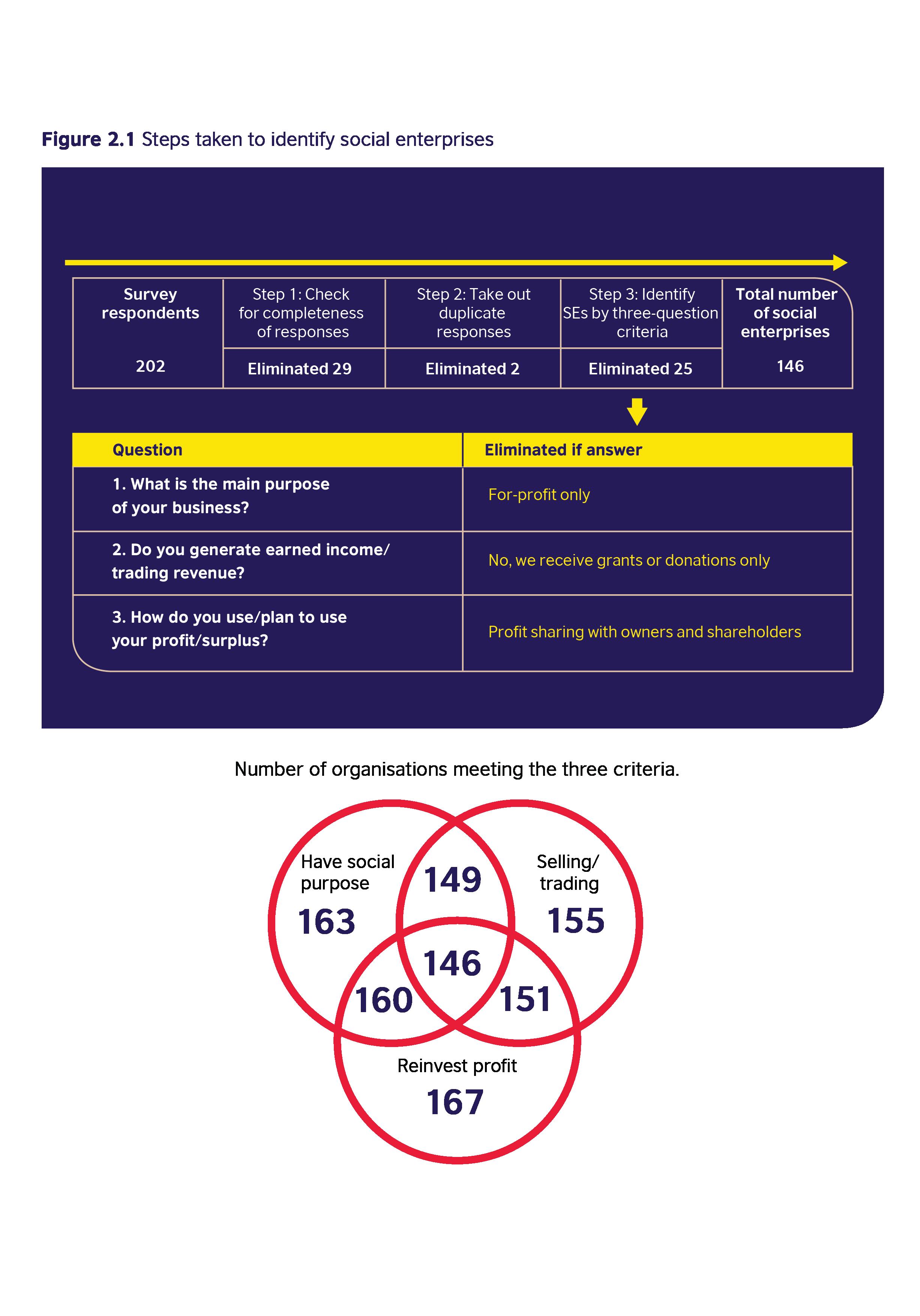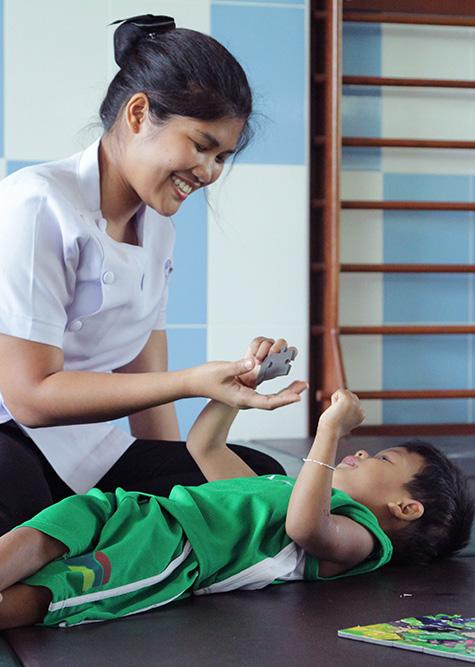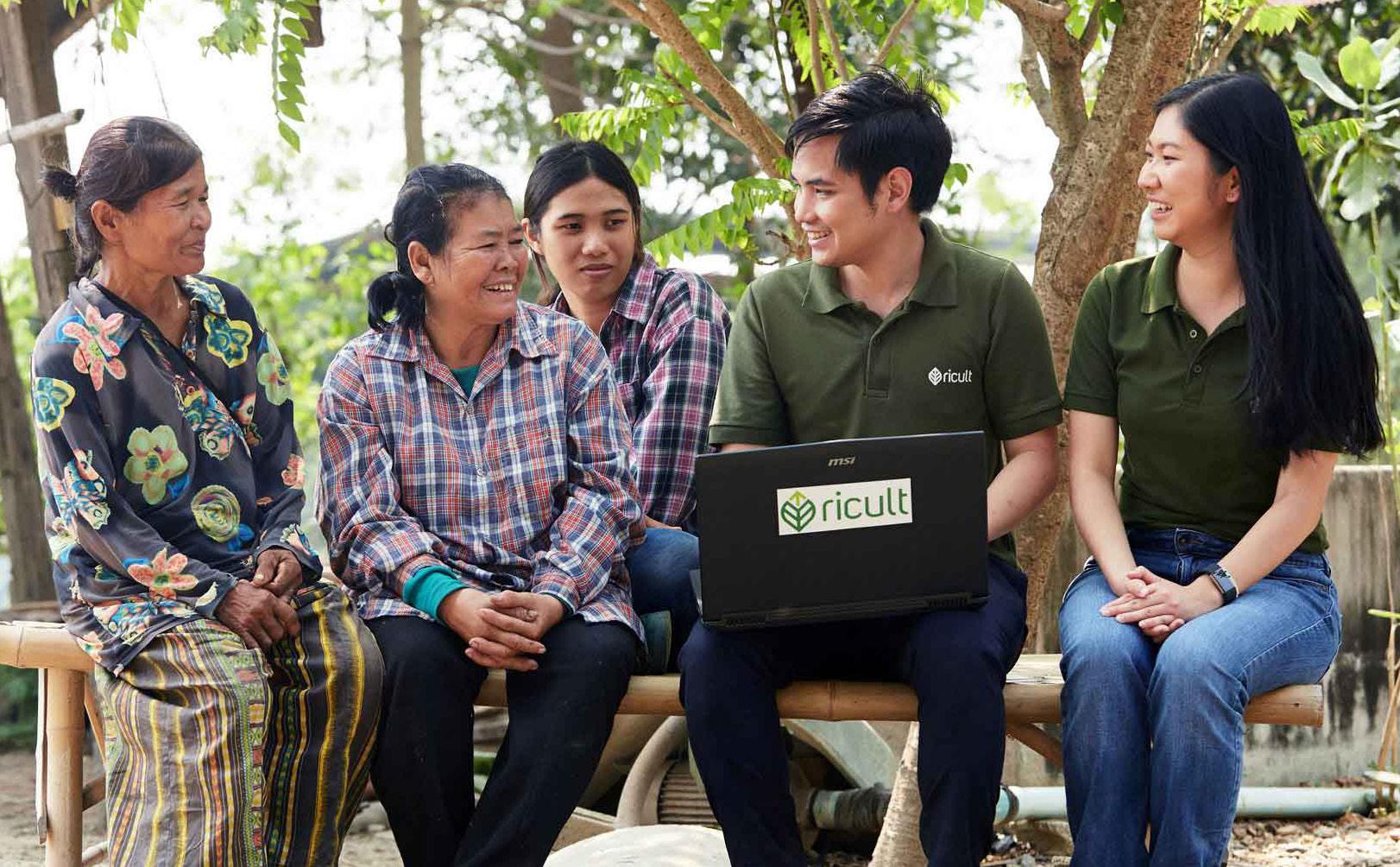
26 minute read
3. Overview: country context and existing research on social enterprise
3
Overview: country context and existing research on social enterprise
Advertisement
3.1 Country overview3
Thailand is one of the most vibrant countries in Southeast Asia, characterised by its welcoming environment for foreign investment, regional offices of many international organisations and significant tourism. The country’s total population is 66.6 million with 16 per cent aged under 14, 64 per cent between 15 and 59 and 17 per cent over 60 (the rest 2 per cent are indistinguishable). The population growth rate from 2018 to 2019 was 0.2 percent. This national trend of low birth rates suggests Thailand will be the second country in ASEAN after Singapore to become an ageing society in 2021, with the population over 60 years old representing 20 per cent of the total population. The country started its modern economic development around the time of the implementation of the first National Economic and Social Development plan in 1958, which initially focused on building national infrastructure and manufacturing for import substitution and for export. Thailand moved from an agricultural economy to greater manufacturing and services levels and became a newly industrialised country (NIC) in 2014. The recent National Economic and Social Development plans have seen growing significance in human and social development with the Sufficiency Economy Philosophy4 as the overarching framework. Thailand is now a middle-income country, with GDP at US$556.90 billion in 2019. The most prominent sector is services, which contribute 61.1 per cent of GDP, followed by industrial sector at 30.9 per cent. The agriculture, forestry and fisheries sector contributes eight per cent of GDP. There are 38.2 million people in the labour force, with only one per cent unemployed. The distribution of labour among sectors includes services at 50.8 per cent, agriculture, forestry and fisheries at 31 per cent, and industrial sector at 16.8 percent. Economic and social development policy in Thailand has recently focused on driving the country out of the middleincome trap5 while closing the inequality gap, which has been widening throughout the development process. The expansion of economic, social and technological hubs to other parts of the country outside Bangkok is one of the key national development strategies.
3 All statistics in this section are from the National Statistics Office. 4 Sufficiency Economy Philosophy is a philosophy initiated by His Majesty King Bhumibol Adulyadej (Rama IV). The philosophy focuses on creating balance between economic growth and society through moderation, rationality and immunity to mitigate the effect from changes. 5 A middle-income trap is commonly defined as a situation in which a country that is successful in lifting its economy from the status of being a least developed or low-income country to a middle-income one but remains at that level without much prospect of becoming an advanced, rich country
3.2 History of social enterprise in Thailand
Social enterprise has a long history in Thailand. Co-operatives that most could fit in the social enterprise criteria, have operated in Thailand for over a century. Early entrepreneur-led social enterprises in Thailand date back to the 1970s. Some royal projects focused on employment for ethnic minorities in the remote mountainous areas, which lacked access to public services and heavily involved in illicit crop cultivation.6 These projects soon developed more commercial business models to ensure their operations’ financial sustainability. These include Doi Kham and DoiTung whose operations and brands are still prominent in the current domestic market. Other wellknown social enterprises in this period were businesses initiated by the Population and Community Development Association, including Cabbages & Condoms Restaurants and Birds & Bees Hotels. In the late 1990s, more social enterprises were established with renowned enterprises including the Chaophya Abhaibhubejhr Hospital, GreenNet Co-operative and Dairy Home.
Case study 2: Cabbages & Condoms
Thailand’s first social enterprise was established in 1975 by Mr. Mechai Viravaidya together with the Population and Community Development Association (PDA), under the name of the Population and Development Company Limited (PDC). The Cabbages & Condoms restaurant is perhaps best known as a successful social enterprise venture. The PDA is known throughout the international community as having played a major role in bringing down the population growth rate and the number of children down to less than two per family. PDA introduced the world’s first community-based distribution of contraceptive to rural Thailand. In addition, it was a major driving force in tackling the spread of HIV/AIDS in the early 1990s which in turn reduced the percentage of infection by 90 per cent through its imaginative condoms campaign, according to the UNAIDS. In turn, this company initiated the Cabbages & Condoms restaurant, which has become one of the best-known social enterprises in the country. Today there are 17 local Cabbages & Condoms restaurants in Thailand and two in England. In areas of rural Thailand, boutique hotels were also established in conjunction with the restaurants. The PDA and the Population and Development Company Limited (PDC) have established 31 other social enterprises, mostly in rural areas. The majority of these social enterprises have focused on providing goods and services to people with limited economic means in the model called Optimisation of Profit ventures. When properly managed, these ventures can survive financially but cannot accumulate sufficient capital to scale up the impact. In parallel, a second model called Other significant social enterprises have been selfestablished by grassroots communities. These include co-operatives and community enterprises, which are registered and promoted by the Ministry of Agriculture and Co-operatives. The recognition of these organisations as social enterprises, even among themselves, and also by the regulators and the wider public is minimal, although most would fit the typical criteria of social enterprise. The most recent wave of social enterprises are those established from 2010 onwards, when the government started to introduce a social enterprise promotion policy. These social enterprises have been acknowledged by the Thai Social Enterprise Office (TSEO) through its publications and media, and later certified by the National Board on Social Enterprise Promotion when the TSEO was closed. The current certifying body for social enterprises is the Office of Social Enterprise Promotion (OSEP).
the Maximization of Profit ventures was also established, whereby profit can only be used for reserves, business expansion and charitable activities. No individuals have benefited from these ventures for the last 46 years. The PDA and the PDC are convinced that combining these two models is vital for the long-term sustainability of their endeavours. Some of the profits from the Maximisation of Profit model, including those from the Cabbages & Condoms restaurants, are used to establish or help expand the Optimisation of Profit social enterprises to benefit the less privileged people in rural communities. Examples of entities established to help this group include factory buildings for rent to provide income in rural areas, rain catchment water tanks, small dam construction and micro credit loan funds in villages to help start and expand income- generating activities for the disadvantaged. The latest service to society through the PDA’s social enterprises, in particular the Birds & Bees Resort and Cabbages & Condoms restaurant in Pattaya, was the establishment of the Mechai Pattana Boarding School for deserving students from 30 of Thailand’s provinces. The school is also known as the Bamboo School, located four hours from Bangkok in Buriram province, Northeast Thailand. Students and parents together pay their school fees in the form of 800 hours of community service per year and planting 800 trees per year, instead of using cash. One major activity of the school is to teach the students about social entrepreneurship, life skills, occupational skills, empathy, and the joy of sharing and giving. The UNFPA has recognised this school as ‘One of the world’s most innovative schools’.
6 The Opium Report B.E.2530–2531 (1987–1988) conducted by the Office of Narcotics Control Board reported as high as 11,245 acres of area with opium cultivation, highly concentrated at the Golden Triangle (Mae Hong Son, Chiang Mai and Chiang Rai Province). This figure has been reduced since the introduction of royal projects in the cultivating areas. The most recent report in B.E. 2560–2561 (2017–2018) reported 235 acres of opium cultivating area in Thailand.
3.3 Social enterprise policy review
3.3.1 Legislation and policies relevant to social enterprise During the past ten years, the Government of Thailand has attempted to promote the concept of social enterprise as a new type of business that addresses social and environment concerns. The first official promotional policy of SEs was the Master Plan for Social Enterprise Promotion B.E. 2553–2557 (2010–2014). In 2011, the Rule of the Office of the Prime Minister on the Promotion of Social Enterprise established the Thai Social Enterprise Promotion Board, chaired by the Prime Minister. In the same year, the TSEO was founded to promote SEs and was planned to be an independent registrar of social enterprises. The office closed in 2016 and the registration process was completed by the Board which registered a total of 103 SEs. Among them, 70 were Pracharath Rak Samakkee (PRS) social enterprises, which were established according to a policy of the then government to engage major conglomerates, civil society organisations, local communities, and academia in the national social and economic development. One PRS SE acts as a central coordination body at the national level and one PRS SE in every province nationwide totalling 76 SEs. Examples of these PRS SEs include Phuket PRS SE which develops local products and connects local communities through trade stores, and Kanchanaburi PRS SE which promotes organic agricultural produce and connects local producers to the provincial hospital. In May 2019, the Social Enterprises Promotion Act B.E. 2562 (2019) was finally enforced, followed by bylaws and official promotional measures believed to be crucial for social enterprise development. Under this law, three entities were introduced as the main policy mechanisms for the promotion of SEs: • The Social Enterprise Promotion Committee, responsible for designing policy and plans relating to the promotion of SEs in Thailand and giving recommendations to the Cabinet to improve related regulations. • The Office of Social Enterprise Promotion (OSEP), which replaced TSEO as the registrar of SEs. At present, there are 141 registered SEs under the new Act. • The Social Enterprise Promotion Fund, providing loans and grants for the registered SEs. There are two types of SE registration according to the Act – the profit-sharing type and non-profit-sharing type. The criteria for the former is more restricted, and the tax benefit of waiving corporation tax is only applicable to the latter. The Act sets out criteria for registration of SEs as follows:
1. Be a juristic person under Thai laws. This may be in the form of a limited company, co-operatives, foundations, and so on. 2. Have social purpose, such as promoting employment of disadvantaged groups, or improving a community, society, or environment. 3. No less than 50 per cent of revenue must come from selling products or services (only restricted for the profit-sharing type). 4. No less than 70 per cent of profit must be reinvested for social purposes (only applicable for the profit-sharing type). 5. Have good governance. 6. Have never been revoked from the registration. 7. No composition of over 25 per cent of the partners, board members, authorised representatives of the entity used to be in the revoked entities. Registered SEs are entitled to four types of benefits: • The right to receive grants or loan from the Social Enterprise Promotion Fund. • Preferential treatment in government procurement. • Tax benefit, which is supported by the Royal Decree on the Taxation Code regarding tax exemption No. 621 B.E. 2559 (2016), granted to the SEs that do not share profit with shareholders, and the investors and donors of SEs. Note that the Royal Decree was specifically introduced as an incentive for the private sector to participate in the PRS SEs, before expanding to include all registered SEs under the new Act. • The Securities & Exchange Commission (SEC) allows registered SEs to raise funds from the public without having to change the legal entity from limited company to public limited company and without applying for the SEC’s permission. The first two benefits are stated in the Act as a framework, meaning the relevant government units can further elaborate these benefits through ministerial-level regulations, which have not been issued yet. The Act also bans any organisations that are not registered SEs from calling themselves ‘visahakit puea sangkom’, which is the direct translation of the words ‘social enterprise’ in Thai, and using the term to promote their organisations. The prohibition does not extend to the use of any English term or similar terms in Thai such as ‘turakit puea sangkom’ (social business).
3.3.2 Government agencies A very important milestone in the Thai social enterprise ecosystem was the launch of the Government’s Social Enterprise Promotion Blueprint 2010–2014, which laid the ground for the establishment of the TSEO in 2011. The office’s mission was to raise awareness of social enterprises among the Thai public, promote and improve the capacity of social enterprises, and ensure access to capital and resources for social enterprises. TSEO was able to push for the draft Social Enterprise Promotion Act and encouraged the first wave of around 200 organisations to apply for social enterprise registration before the office was closed in 2016. Political change during that time prolonged the enactment of the Act and the re-establishment of a new office. Many new social enterprises were established during the TSEO era, as seen in the finding from the survey. During the interim period with no government agency responsible for social enterprises between 2016 to 2018, a National Board on Social Enterprise Promotion, presided by the Prime Minister (with the Ministry of Social Development and Human Security as the secretariat), was set up. The Board helped pass the Act through the National Assembly as well as registering organisations that had applied for social enterprise status with the TSEO. One-hundred-and-three organisations were registered as social enterprises during this period. In 2019, the Social Enterprise Promotion Act was finally enacted. To promote social enterprises, the Act allowed for the establishment of three governmental mechanisms – the National Social Enterprise Promotion Committee, the OSEP and the Social Enterprise Promotion Fund. The core of these mechanisms is the OSEP, which is responsible for the registration of social enterprises and the implementation of promotional plans and related measures. As of September 2020, there have been in total 141 organisations registered as social enterprises.
Agencies National Social Enterprise Promotion Committee
Office of Social Enterprise Promotion
Social Enterprise Promotion Fund (still needs a by-law to put the Fund into force) Main responsibilities
- Design strategy, policy and promotional plan and report to the Cabinet - Approve operational plan proposed by the Office - Recommend to the Cabinet on the improvement of related regulations - Regulate OSEP - Register social enterprises - Responsible for the administrative and academic tasks of the Committee - Advise, train and promote social enterprises - Ensure promotional measures for pre-social enterprises - Act as the centre of information and distribution of information on social enterprises - Manage the Social Enterprise Promotion Fund - Give loans to registered social enterprises - Provide grants for early-stage enterprises - Assist the supporting agencies in delivering according to the promotional plan
3.3.3 List of leading players in the social enterprise ecosystem
Incubators, accelerators, and support programmes
Banpu Champion for A social enterprise programme started in 2011 with the aim to promote the development Change by Banpu PCL. of sustainable businesses by entrepreneurs in Thailand. The nine-month programme and ChangeFusion targets those who have preliminary insights into their customers and beneficiaries and have already started testing their ideas. The programme provides them with workshop training, coaching as well as funding up to 330,000 Baht to help transform their ideas into viable social businesses. On average, ten social enterprises had been incubated annually, which came from a wide range of impact areas such as agriculture, community development, education, healthcare, etc. BKIND Mutual Fund A mutual fund that invests in Environmental, Social and Corporate Governance listed companies and contributes 40 per cent of its management fee towards grants for impact projects, including those delivered by social enterprises. National Innovation A public organisation that promotes innovation, including social innovation. It provides Agency (NIA) supports for social enterprises that demonstrate social innovation through various services: - medium-sized grants (300,000 Baht each) for social entrepreneurs, youth or local public administrative office to turn ideas into prototypes - large-sized grants (not over 1.5 million Baht each) for social innovation projects - subsidised interest for bank loans for growth-stage enterprises (not over 3 million Baht) that demonstrate social innovation The NIA also provides in-kind support including social impact assessment and a database of social innovation for interested entrepreneurs to use for replication. School of Changemakers An intermediary with initiatives to build support systems for changemakers in Thailand. (SOC) SOC provides a seven-month incubation programme for changemakers who want to start a social project or enterprise with small seed grants, a coach, tools and access to community. SOC also supports other organisations and universities to build their own social incubation programmes. Besides that, SOC runs a network of universities and schools that adjust their curriculum and extra-curriculum to better nurture the future workforce via changemaking experiences. SEED Direct support for social enterprises: - SEED Awards – an acceleration programme organised every two years, offering the winner one-year development support through the SEED enterprise toolkit and grant of around 10,000 euros; and the runners-up with six-month development support, and a 1,500-euro grant. - incubation programmes for starters and replicators
SE Thailand
Snowball Incubation Programme by Rise Impact
Ecosystem support - Business Development Service+ – a training of trainers, offering providers of enterprise support access to toolkits, case studies and further valuable insights into eco-inclusive enterprise success. - Practitioner Labs for Policy Prototyping and Climate Finance A membership-based organisation that supports SE members through its partnership with corporates in delivering services including - capacity building – trainings and workshops - marketplace – space provision for fairs to exhibit and sell SE services and products, special projects such as the Happy Gift 2021 project - capital – special-conditioned loans for SEs An incubation programme to support seed and early-stage social enterprises to find the right impact and business model that fits with their mission, by offering mentorship, entrepreneur skill building, networking and funding opportunities.
Incubators, accelerators, and support programmes
Stock Exchange of SET Social Impact Platform, an exchange that contributes to SE ecosystem platform Thailand (SET) development. - a digital platform that list impact creators (social enterprises) with impact concerning businesses (private sector) to create visibility among the two sides and open opportunities for co-creation and business matching
Taejai.com
Thai Health Promotion Fund
Capacity building - SE 101 – a course for the public interested in social entrepreneurship, offering online and offline and also in partnership with universities under SE101@ University - SE 102 – a course for social entrepreneurs who have ideas to start their projects - SET Social Impact Gym – an acceleration programme with executives of listed companies contributing as coaches; the programme ends with a speech day that matches social enterprises who need support with listed companies A crowdfunding social enterprise that connects impact projects to charitable backers and donors. It raised over 150 million Baht through more than 10,000 backers. Many social enterprises have used Taejai to raise fund for their projects, especially in piloting new products and services. A governmental fund that offers grant to preventive health projects.
UNDP
Win-Win War by C asean
The UNDP is the leading United Nations organisation fighting to end the injustice of poverty, inequality, and climate change. Working with its broad network of experts and partners in 170 countries, it helps nations to build integrated, lasting solutions for people and planet. In Thailand, UNDP seeks to strengthen the social innovation and impact investment ecosystem by working closely with various stakeholders including the government, private sector, and civil society to create the policy and environment conducive to social entrepreneurship. These include, but are not limited to, raising awareness about the concept of sustainability and social entrepreneurship, facilitating communication and collaborative efforts among different actors towards achieving SDGs via entrepreneurial and innovative solutions, developing the social economy at the local level, and exploring innovative financial structures to diversify the resourcing and implementation of the SDGs. Flagship initiatives include Youth Co:Lab, SDG Impact Accelerator programme, Thailand Social Innovation Platform, etc. A televised reality show competition initiated in 2019. The programme recruits and incubates social entrepreneurs while raising awareness of the social enterprise concept to the public at large. Final round contenders receive tailored business coaching, and the winner receives a grant of 2 million Baht as well as ongoing business advice. The programme is going into its third year, with the aim to expand its audience base to ASEAN countries through online streaming.
Impact investors
Impact investment in Thailand is still limited to a small circle of angel investors. Most debt and equity investors focus on financial return and investors focusing all or part of their investment on social or blended return are rare. The list of impact investors in this table are those that explicitly declare that they invest in social enterprises or impact organisations. On another note, there is vibrant investment scene for startups in the country, providing an opportunity to raise awareness for such investors to contribute part of their portfolio for investment on SEs.
ADB Ventures
ChangeVentures
Government Savings Bank (GSB)
Impact Collective (IC)
A venture capital fund providing investments and technical assistance to highly scalable technology business that deliver impact according to the SDGs. An impact consulting and social investment advisory firm that connects impact enterprises to supporters and investors. It also has a small investment arm to invest directly into impact enterprises via equity and short-term loans. In December 2020, GSB launched a special- loan scheme targeting SEs that want to overcome limited access to debt financing. The preferential conditions include less restrictive criteria on previous business performance, lower interest rate and lower value of collateral required. SEs have most often stated the collateral requirement as an obstacle in securing debt financing from financial institutions. An acceleration programme for impact startups in Asia. IC invests in, supports, and connects startups to accelerate their positive impact. As of September 2020 which was the first year of its operation, 100 impact organisations in Asia were listed on the programme including two SEs from Thailand.
Higher education institutions, research institutes and support organisations
Aspen Network of A membership-based organisation that aims to create a thriving entrepreneurial Development ecosystem for Small and Growing Businesses (SGBs). ANDE network provides support to Entrepreneurs (ANDE) Entrepreneurs Support Organisations (ESOs) and social enterprises through knowledge sharing events and research under the “Entrepreneurial Ecosystem Snapshots” that provide entrepreneur supporters with an overview of the ecosystem, its gaps and opportunities which help supporters to better design and implement their programmes. Bangkok University The School of Entrepreneurship and Management offers both bachelor’s and master’s (Bangkok) (BUSEM) degrees in entrepreneurship, with social entrepreneurship as one of the core modules. The School admits around 350 students and 50 students per year for the bachelor’s and master’s degrees respectively. BUSEM is preparing all the entrepreneurial students to have actual practices in the real business environment. British Council British Council promotes the development of social enterprise as a means of addressing entrenched social and environmental problems and delivering positive change to our communities and societies. The British Council’s work draws on UK and global experience and is delivered across more than 30 countries with local and international partners. Together, we: - provide social entrepreneurs with access to training, mentoring and funding opportunities - promote social enterprise education in schools and universities - convene policy dialogues, conduct research and organise study tours to share knowledge and best practice in creating an enabling environment for social enterprise - deliver international development actions that focus on social enterprise
It is a systemic approach designed to help foster a more sustainable, inclusive and prosperous future and build collaboration, opportunities and trust between the UK and other countries.
Payap University (Chiang Mai)
Srinakharinwirot University, Faculty of Business Administration for Society (Bangkok)
TDRI
Thammasat University, The School of Global Studies
Bachelor of Social Entrepreneurship, Faculty of Humanities and Social Sciences - Newly created course in the academic year 2019–2020, with three students in the first batch. There are currently 15 applications for 2020–2021.
Centre for Social Impact (CSI) - The Centre was established in 2019, bringing expertise from cross-faculties and acting as a hub for social entrepreneurship in Chiang Mai. - The CSI mission is to provide advocacy, training, consulting, information resources and academic services for policymakers, practitioners, funders, and the academic community in Thailand and the wider ASEAN community, on a sustainable social enterprise model of self-sufficiency. With this, CSI’s goal is to create positive transformational social impact for the communities it serves. - In 2020, CSI implemented projects in Sustainable Tourism, Social Entrepreneurship, Community Organisational Development, Education Internationalisation and Green Entrepreneurship, working with partners across 16 countries in Asia and Europe. Established in 2018, the Faculty was leveraged from the Business Administration Department, Faculty of Social Sciences. The courses it offers include - Bachelor of Business Administration programme in Social Enterprise – a four– year course of which the core module includes accounting, marketing, administration, economics, commercial law, social enterprise, social-enterprise oriented research and social innovation. The course also incorporates a compulsory internship and business project. The first batch of 41 students has grown to around 130 in the second year. - Master’s degree – there isn’t a specific programme on social entrepreneurship, but social enterprise as a subject is provided for students. - Social Entrepreneurship Programme – a short course for the public (48 hours in one month).
A public policy research institute that provides technical analysis to various public agencies. The aim is to help formulate policies to support long-term economic and social development in Thailand. TDRI has conducted several studies regarding SE ecosystem including two projects commissioned by the Thai Health Promotion Foundation, namely: - Social investment for sustainable development in Thailand - Knowledge management and academic support plan for vulnerable population The School of Global Studies offers a Bachelor of Arts in Global Studies and Social Entrepreneurship. It is a four-year degree with an innovative structure that lays the foundation on local development and globalisation during the first two years. The third year focuses on managing social innovation and social enterprises, followed by the senior project in the last year.
The School also offers a Master of Arts in Social Innovation and Sustainability. The programme has the mission of developing a vibrant community of practitioners and researchers in Southeast Asia with the knowledge, mindset and skills to tackle the region’s most pressing Sustainable Development Goal challenges. Through a dynamically designed programme, students learn to identify, research and understand global and regional social, economic and environmental challenges. They develop skills in design thinking and other research methods to understand problems and create solutions aligned with the local social and cultural context. Students gain skills in working with a diverse range of stakeholders and measuring the social and environmental impact of innovations, plus organisational activities to understand how to manage organisations sustainably.
Thammasat University, Puey Ungphakorn School of Development Studies (Pathumthani)
The School offers three degrees: - Bachelor of Arts Programme in Creative Development – a four-year degree comprising of three modules: contemporary community development, volunteer work management; corporate social responsibility, and social enterprise development. For the social enterprise development module, the subjects concentrate on all skills needed to run a social enterprise such as business model, social finance and social impact assessment. The degree began in 2016 and there were 91 graduates from the first batch in 2020. There are currently around 300 students studying for this degree. - Graduate Diploma (Graduate Volunteer) – a one-year programme comprising three months in classroom lectures, seven months in field practice in community work and two months for a special report. - Masters of Arts Programme in Creative Development – this was previously the Masters of Arts in Rural Studies, with added subjects such as social innovation, social impact assessment in response to the change in rural economic and social landscape.
Case study 3: Ricult
Ricult is a social enterprise, that develops AI/ technology/financial-based digital solutions for the agricultural ecosystem, focusing on smallholder farmers in developing countries. Its vision is to be the preferred digital financial solution for farmers to help them work their way out of poverty. Ricult has developed an all-in-one application that tackles almost all farmers’ pain points, including low yield, difficult access to finance and market. Its technology in machine learning and satellite imagery helps farmers to make the right decision at the right time, such as time to start planting each crop given the prediction of rainfall in that particular year. This technology has become even more relevant due to the climate change where farmers can no longer rely on their traditional knowledge of the climate pattern. Its design of a business model ensures that the farmers, who are its direct beneficiaries, get the most out of it by using this application for free. As one-third of the population in Thailand is employed or self-employed in the agricultural sector, the impact is huge. Ricult has acquired over 250,000 users within less than two years, and the number is growing at a rate of 1,000 a day. Information collected from these farmers is used by Ricult’s customers such as banks, food processing and agribusinesses to make more informed decisions about yield forecasts, risk profiling, credit scoring, extreme weather, flood assessment and customer acquisition leading to improved operational efficiencies. The prospect of this is raising the bar in the agricultural sector through creating commercial value to all stakeholders. The recent function of the Ricult application is to help link the farmers to the market.
In the past decade, the concept of social enterprise has received some attention among academics. But beyond the Master Plan of Social Enterprise Promotion B.E. 2553–2557 (2010–2014) published by TSEO in 2011, there is limited material that looks at SEs at the broad national level in Thailand. Beyond this, research papers on SEs in Thailand largely adopt qualitative tools to gather information, through in-depth interviews, focus groups, observation, and document review. Research questions tend to have a specific focus, e.g. being sector-specific or area-based, and aim to find factors that can help SEs to grow. For example, the Department of Older Persons and Thaipat Institute (2016) reviewed how to apply the concept of social enterprise and corporate social responsibility to promote businesses that benefit the elderly in Thailand. Yet some research does take a broad view, including: • Siripatsopon (2015) studied how social enterprises in Thailand might be further developed, and proposed tax incentives and laws to promote SEs. • Parinyasutinun (2017) reviewed how to apply the concept of social enterprise to a community enterprise and found that sources of funding and concrete promotional policies are necessary to facilitate the transformation of community enterprise into SE. • Piroonjinda (2016) looked into legal problems when registering SEs under the form of a limited company, and found that the ambiguous definition of social purpose, minority shareholder rights protection, duties and liabilities of directors, and stakeholders’ rights may emerge as legal problems. • Doherty and Kittipanya-ngam (2020) investigated the development of the social enterprise in Thailand, from the emergence of the non-profit sector in the 1970s to the new country type Social Enterprise Semi Strategic Diverse model form. The study pinpointed the key institutions, networks, cognitive framings and policy initiatives of social enterprise emergence and development in Thailand. Overall, there is a lack of any quantitative studies of SEs in Thailand, especially ones that are conducted at a national level. This study aims to help fills this gap in the literature.
